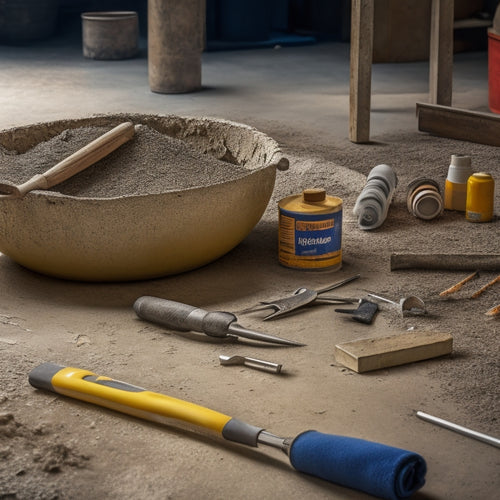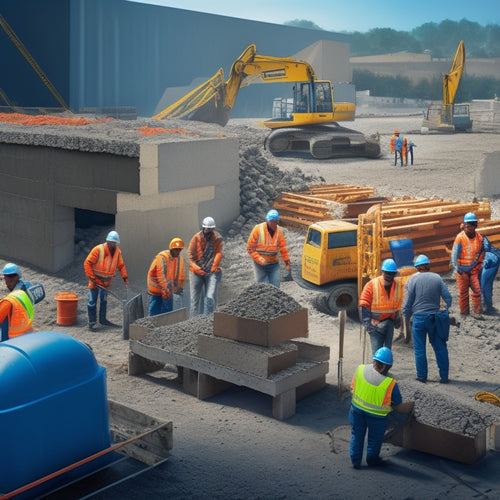
7 Best Tools for Drilling Through Concrete Blocks
Share
When tackling a concrete block project, you'll need the right tools to drill through these dense materials efficiently and effectively. Start by selecting the appropriate drill bit, such as carbide-tipped or diamond-coated bits, which can drill up to 10 times faster than traditional bits. Prepare the concrete surface by cleaning and evaluating the site for potential hazards. Choose a reliable hammer drill, like the Bosch 11264EVS or DeWalt D25263K, or consider a rotary hammer drill or core drill for larger holes. Don't forget to follow safety precautions, including wearing PPE and maintaining a safe distance from the drilling area. You're just getting started - and there's more to explore.
Key Takeaways
• Select the right drill bit, such as carbide-tipped or diamond-coated, to ensure efficient and accurate drilling through concrete blocks.
• Prepare the concrete surface by cleaning and assessing the site for potential hazards and weak points before drilling.
• Choose a suitable drill, such as a hammer drill or rotary hammer drill, that matches the drill bit and concrete block density.
• Adjust drill speed based on concrete block density and maintain proper drill bit maintenance to prevent overheating and premature wear.
• Always wear personal protective equipment and ensure a well-ventilated work area to minimize dust and fume accumulation during drilling.
Selecting the Right Drill Bit
When tackling a concrete block drilling project, accuracy hinges on choosing the right drill bit, as the wrong one can lead to premature wear, reduced efficiency, and even safety risks.
You'll need to take into account the type of bit materials that'll effectively penetrate the concrete. Carbide-tipped bits are a popular choice, as they're durable and resistant to wear. However, diamond-coated bits are also effective, especially for larger or more intricate holes.
It's essential to verify drill compatibility when selecting a bit. Check your drill's specifications to confirm it can handle the bit's diameter and material.
You'll also want to factor in the drill's power output, as some bits require more torque than others. A bit that's incompatible with your drill can lead to reduced efficiency, overheating, or even damage to the drill.
Preparing Concrete for Drilling
With your drill bit selected, you're now ready to prepare the concrete block itself for drilling, a step that's just as critical to the project's success. This involves concrete surface preparation, which is essential for effective drilling.
Begin by cleaning the area around the drilling site to prevent debris from interfering with the drilling process. Remove any dirt, oil, or grease that may be present on the concrete surface, as these can compromise the bond between the concrete and the drill bit.
Next, conduct a drilling site assessment to identify any potential hazards or obstacles that could hinder the drilling process. Check for cracks, weak points, or other defects in the concrete that may affect the stability of the block. If you find any, consider using a different drilling location or taking steps to reinforce the concrete before proceeding.
Best Hammer Drills for Concrete
You'll need a hammer drill that can deliver high-torque, high-impact performance to effectively drill through concrete blocks, and several top models stand out for their reliability and efficiency.
When choosing the best hammer drill for concrete, consider factors such as power, speed, and durability.
Here are some of the top-rated hammer drills for concrete:
-
Bosch 11264EVS: With its 13-amp motor and 1,300 RPM, this drill delivers exceptional power and speed. Users praise its durability and ease of use.
-
DeWalt D25263K: This hammer drill features a 10-amp motor and 1,500 RPM, making it suitable for heavy-duty concrete drilling. Reviewers rave about its reliability and ergonomic design.
-
Makita HR2475: This drill boasts a 9-amp motor and 1,100 RPM, making it ideal for drilling through concrete blocks. Users appreciate its compact design and low vibration.
- Hitachi DH24PF: With its 11-amp motor and 1,200 RPM, this drill is designed for heavy-duty concrete drilling. Reviewers praise its high-torque performance and comfortable grip.
These top brands are backed by excellent user reviews, ensuring you'll find a hammer drill that meets your concrete drilling needs.
Rotary Hammer Drills for Efficiency
When you're working with concrete blocks, you need a drill that can efficiently power through the tough material.
That's where rotary hammer drills come in, offering a range of features that make them ideal for this task.
You'll want to pay attention to the type of hammer drill bits used, the availability of variable speed control, and the incorporation of reduced vibration technology to get the job done quickly and effectively.
Hammer Drill Bits
Using hammer drill bits, specifically designed for rotary hammer drills, greatly boosts your efficiency when drilling through concrete blocks, allowing you to complete tasks faster and with less fatigue.
When choosing the right hammer drill bit, you'll need to evaluate the type of hammer drill you're using and the material of the drill bit.
There are several types of hammer drills, including rotary hammers, demolition hammers, and combination hammers. Each type requires a specific drill bit material to maximize efficiency.
Here are some key considerations:
-
Tungsten carbide (TC) bits: Ideal for drilling into concrete, brick, and block.
-
Diamond-coated bits: Best for drilling into hard concrete, asphalt, and rock.
-
Carbide-tipped bits: Suitable for drilling into brick, block, and soft concrete.
- SDS (Slotted Drive Shaft) bits: Designed for use with rotary hammers and offer improved shock absorption.
Variable Speed Control
Rotary hammer drills equipped with variable speed control enable you to adapt to changing drilling conditions, optimizing efficiency and reducing the risk of bit breakage when drilling through concrete blocks.
With variable speed control, you can adjust the drill's speed to match the specific demands of your project. This feature is particularly useful when drilling through concrete blocks, as it allows you to tackle varying densities and hardness levels with precision.
The variable speed benefits are twofold. To begin with, it enables you to maintain a consistent drilling pace, even in challenging conditions. In addition, it reduces the likelihood of overheating, which can lead to motor damage or premature wear.
The speed control mechanisms in these drills are typically designed with a variable speed trigger or a dedicated speed dial, allowing you to make precise adjustments on the fly. By having greater control over the drill's speed, you can complete your project more efficiently, with reduced downtime and improved overall performance.
Reduced Vibration Technology
You'll appreciate the reduced fatigue and improved control offered by rotary hammer drills equipped with reduced vibration technology, which helps mitigate the physical demands of drilling through concrete blocks. This innovative feature is particularly useful when working on large projects or repetitive tasks, where vibrations can quickly take a toll on your body.
Rotary hammer drills with reduced vibration technology incorporate advanced vibration dampening systems, which absorb and dissipate the vibrations, resulting in a more comfortable and controlled drilling experience. This, combined with ergonomic design, allows for a more efficient transfer of power and reduced operator fatigue.
Here are some key benefits of rotary hammer drills with reduced vibration technology:
-
Improved control: Reduced vibrations enable more precise drilling and improved accuracy.
-
Increased comfort: Vibration dampening systems reduce operator fatigue and discomfort.
-
Enhanced efficiency: Ergonomic design and reduced vibrations enable faster drilling and improved productivity.
- Extended tool life: Reduced vibrations also reduce wear and tear on the drill, extending its lifespan.
Core Drills for Large Holes
Drilling large holes in concrete blocks requires a specialized tool, and core drills are the go-to choice for this task. When you're faced with this challenge, you'll need to select the right core drill type for the job. There are two main categories: electric and hydraulic. Electric core drills are suitable for smaller to medium-sized holes, while hydraulic core drills are better suited for larger holes and heavier-duty applications.
To achieve ideal results, you'll need to master core drilling techniques. This includes proper alignment, stable positioning, and controlled feed pressure. It's vital to maintain a steady pace and avoid applying too much pressure, which can cause the drill bit to bind or the concrete to crack.
Additionally, using the correct drill bit size and type is important, as it directly affects the drilling speed and accuracy. By choosing the right core drill and honing your core drilling techniques, you'll be able to efficiently and effectively create large holes in concrete blocks with precision and accuracy.
Diamond-Coated Drill Bits for Speed
When you're looking to drill through concrete blocks quickly, you'll want to focus on the fastest diamond-coated drill bit types, as they can greatly reduce drilling time.
The coating material used on these bits matters most, as it directly affects their performance and lifespan.
Fastest Drill Bit Types
With diamond-coated drill bits, you can expect to shave off up to 70% of your drilling time, thanks to their exceptional cutting speed and durability. When drilling through concrete blocks, you need a bit that can withstand the abrasive nature of the material. Diamond-coated drill bits excel in this area, offering superior drill material compatibility and bit wear resistance.
Here are four key benefits of using diamond-coated drill bits:
-
Faster drilling: Diamond-coated drill bits can drill through concrete blocks at speeds of up to 10 times faster than traditional drill bits.
-
Longer lifespan: The diamond coating provides exceptional wear resistance, extending the lifespan of the drill bit and reducing the need for frequent replacements.
-
Improved precision: Diamond-coated drill bits maintain their cutting edge throughout their lifespan, ensuring precise and accurate holes.
- Reduced heat buildup: The diamond coating helps to dissipate heat generated during drilling, reducing the risk of overheating and increasing the overall efficiency of the drilling process.
Coating Materials Matter Most
You can optimize drill bit performance for speed by selecting the right coating material, as it plays a critical role in determining the bit's cutting ability and lifespan.
When it comes to drilling through concrete blocks, diamond-coated drill bits are the way to go. These bits feature a thin layer of diamond grit bonded to the steel shank, providing exceptional coating durability and resistance to wear. The diamond coating's high hardness and thermal conductivity enable it to withstand the intense heat and friction generated during drilling, resulting in faster penetration rates and longer bit life.
The key to a diamond-coated drill bit's performance lies in its coating adhesion. A strong bond between the diamond grit and the steel substrate guarantees that the coating remains intact, even under extreme drilling conditions. This, in turn, allows the bit to maintain its cutting edge and drilling efficiency.
Drill Speed Optimization
By adjusting the drilling speed to match the concrete block's density and the diamond-coated drill bit's capabilities, you can release peak performance and achieve faster drilling times.
Ideal speed settings are essential to maximizing the drill bit's potential, and improper settings can lead to reduced efficiency, heat buildup, and premature wear.
To enhance drill speed, consider the following key factors:
-
Concrete block density: Adjust speed according to the block's density, with harder blocks requiring slower speeds and softer blocks allowing for faster speeds.
-
Drill bit capabilities: Consult the drill bit's specifications to determine its recommended speed range and ideal RPM.
-
Drill maintenance: Regularly maintain your drill to guarantee peak performance, including cleaning, lubricating, and replacing worn components.
- Speed adjustments: Make incremental speed adjustments during drilling to find the sweet spot that balances speed and control.
Safety Precautions for Drilling Concrete
Drilling through concrete blocks can be hazardous, and taking necessary safety precautions is vital to avoid injuries and secure a successful operation.
You must prioritize personal protective equipment, including safety glasses, gloves, and a dust mask to prevent debris and dust inhalation. Confirm your work area is well-ventilated to prevent the accumulation of dust and fumes.
Effective dust management is important when drilling through concrete. You can use a vacuum cleaner or a dust collection system to minimize airborne particles. Additionally, consider using a drill bit with a dust-reducing design or a drilling technique that minimizes dust creation. It's also important to maintain a safe distance from the drilling area to avoid exposure to flying debris.
Remember to inspect your drill and accessories regularly to confirm they're in good condition. Worn-out or damaged equipment can increase the risk of accidents.
Frequently Asked Questions
Can I Use a Regular Drill for Drilling Through Concrete Blocks?
You're wondering if you can use a regular drill for drilling through concrete blocks. While it's technically possible, it's not the most effective approach.
Concrete drilling techniques require specialized drill bits that can withstand the abrasive nature of concrete. Regular drill bits will quickly wear out or break.
You'll need to invest in drill bits specifically designed for concrete, such as diamond-coated or carbide-tipped bits, to guarantee a successful and efficient drilling process.
How Do I Prevent Dust From Spreading While Drilling Concrete?
As you're about to start drilling, isn't it amazing how a little preparation can make all the difference?
To prevent dust from spreading while drilling concrete, you'll want to focus on dust control. Invest in a vacuum system specifically designed for concrete drilling, which can capture up to 99% of airborne particles.
This won't only keep your workspace clean but also reduce respiratory hazards. By taking this vital step, you'll guarantee a safer, more efficient drilling experience.
What Is the Ideal Temperature for Drilling Through Concrete Blocks?
When drilling through concrete blocks, you'll want to maintain an ideal temperature between 40°F and 90°F (4°C and 32°C). Extreme temperatures can cause thermal shock, leading to concrete degradation.
Optimize your drill speed according to the bit type and concrete density. High drill speeds can generate excessive heat, while low speeds can lead to slow progress.
Balance your drill speed to prevent overheating, which can compromise the structural integrity of the concrete.
Can I Drill Through Concrete Blocks With Rebar Reinforcement?
Like Hercules tackling the Hydra, you're facing a formidable foe: concrete blocks with rebar reinforcement.
Can you drill through them? Yes, but it's essential to know your rebar types. Fibermesh or wire mesh won't be as challenging as steel rebar.
Employ specialized drilling techniques, such as using a hammer drill or a diamond-coated bit, to minimize damage and maximize success.
Don't rush in unprepared - assess the rebar layout and adjust your strategy accordingly.
How Often Should I Replace Drill Bits When Drilling Concrete?
When drilling through concrete, you'll find that drill bit longevity largely depends on your concrete drilling techniques.
You should replace your drill bits every 1-2 inches of drilling depth or when you notice a significant decrease in drilling speed.
If you're using a high-quality bit, it may last longer, but be cautious not to overuse it, as this can lead to premature wear and reduced accuracy.
Conclusion
You've made it to the end of this concrete-drilling journey, but your work is far from over.
With the right tools and techniques, you're now ready to tackle even the toughest concrete blocks.
But, as you fire up your drill, remember that concrete can be unforgiving - one misstep, and your project can come crashing down.
Stay focused, stay safe, and get ready to release your drilling prowess like never before.
The concrete won't know what hit it.
Related Posts
-

Top Tools for Repairing Cracked Concrete Surfaces
When tackling a cracked concrete surface repair, you'll need the right tools to guarantee a durable fix. Start with e...
-

5 Best Tools for Stamping Concrete Walls
When it comes to stamping concrete walls, you'll need a range of specialized tools to achieve the desired texture and...
-

7 Best Tools for Concrete Block Construction
You'll need a solid foundation, precise cutting, and seamless finishing to guarantee your concrete block construction...


